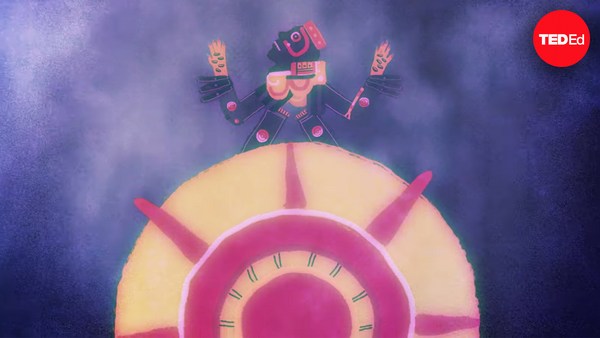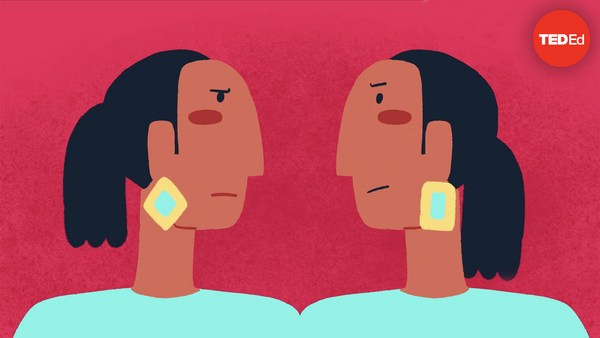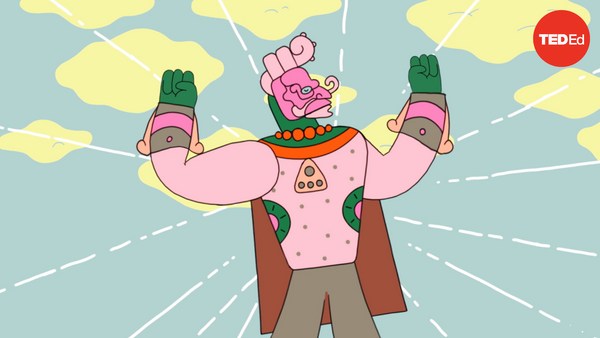The moon goddess, Ix Chel, patiently watched a spider at work. She could make use of it skills, she thought. Through careful observation and imitation, she soon became a skilled weaver.
The sun god, Kinich Ahau, was impressed with her work, and admired her from afar. But the goddess’ grandfather was very possessive and would not let the sun god anywhere near his beloved granddaughter.
To get past the grandfather, the sun god disguised himself as a hummingbird. As he took a drink of tobacco flower honey, the moon goddess spotted him and asked her grandfather to capture the bird for her. The grandfather shot the disguised sun god with a blow dart, stunning him.
Ix Chel nursed the wounded bird back to health, and soon, he was able to spread his wings and fly again. He transformed back into the sun god and invited the moon goddess to escape with him.
The two rowed away in a canoe, but the grandfather called upon the powerful storm god to help him stop them. Sensing danger, the moon goddess jumped from the canoe into the water below and transformed into a crab. But the storm god had already thrown a lightning bolt, which hit the crab and pierced her through her heart, killing her.
Hundreds and hundreds of dragonflies gathered, buzzing songs and fluttering their transparent wings. They formed a thick, magical cloud over the moon goddess’ body. For thirteen days the dragonflies cut, cleaned, and hollowed thirteen logs. On the thirteenth night, the logs burst open, and the moon goddess emerged— alive and more brilliant than ever.
The sun god wasted no time in proposing marriage. The moon goddess happily agreed. Side-by-side, they were ready to light up the sky with their powerful rays.
Unfortunately, the story doesn’t end there. The sun god’s brother visited often. Sensing he was also in love with Ix Chel, the sun god grew jealous, and began to mistreat her.
One day, Ix Chel was sitting on the riverbank, furious at her husband. A huge bird came gliding down and offered to take her to the high mountain peaks. To get away from the cruel sun god, she agreed. There, she met the king of the vultures.
The vulture king was kind and fun-loving— a much better partner than the violent sun god. The moon goddess made a new home with him in the mountains.
When the sun god heard, he was distraught. He hid inside a deer carcass until a hungry vulture came swooping down, then hopped onto its back and rode to the mountain kingdom where the moon goddess now lived with the vulture king.
He begged her to come home with him, apologizing for how he had treated her. The kind and forgiving goddess took pity on him and agreed to go back.
But Kinich Ahau soon began to show his true nature again. He struck her, scarring her face and dimming her bright rays.
Ix Chel flew off into the dark. From then on, she vowed to appear only at night. She befriended the stars, and combined her pale blue rays with their light to guide night travelers to safety. She used her healing gift, which she had once used on the wounded sun god, to cure people who were ill.
Today, Ix Chel is so widely known that she’s become a symbol of Maya culture. But archeological evidence suggests that for the ancient Maya Ix Chel and the moon goddess were separate deities. In the retellings of Maya people and the records of anthropologists, the two have merged so that Ix Chel’s story extends beyond the limits of the historical record. Her story, like all myths, isn’t just one story: the variations, ancient and modern, speak to what people value, and how they see themselves in their mythological heroes.


